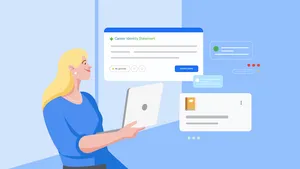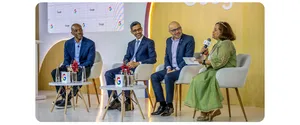7 pieces of AI news we announced in September
For more than 20 years, we’ve invested in machine learning and AI research, tools and infrastructure to build products that make everyday life better for more people. Teams across Google are working on ways to unlock AI’s benefits in fields as wide-ranging as healthcare, crisis response and education. To keep you posted on our progress, we're kicking off a regular roundup of Google's most recent AI news across products, research and more. To start, here’s a look back at just a few of our AI announcements from September.

In his keynote speech at the United Nations’ first “Summit for the Future,” Google CEO Sundar Pichai announced a $120 million Global AI Opportunity Fund to expand AI education and training, and made a case for public-private partnership to ensure AI benefits everyone, everywhere. “With AI, we have the chance to be inclusive from the start, and to ensure that the digital divide doesn’t become an AI divide,” he said. As Sundar concluded to the audience of international policymakers, “We are excited to be your partner, and to work with you to make sure bold innovations are deployed responsibly so that AI is truly helpful for everyone. The opportunities are too great … the challenges too urgent ... and this technology too transformational, to do anything less.”

We added Audio Overviews to NotebookLM, our AI-powered research assistant that uses Gemini models to help you understand complex information even more quickly. With Audio Overview, two AI hosts have an in-depth discussion based on information in the materials you upload. You can learn while you listen and even download the conversation to refer to later. We also added the option to upload YouTube URLs and audio files to NotebookLM, along with a new way to share your Audio Overviews directly with others in a couple of taps. With Audio Overview, it’s easier than ever to learn more — and share more — about the fascinating topics you care about.
Google Cloud and Google Workspace hosted Gemini at Work, a global digital event to explore how AI is reshaping businesses around the world. The event showcased more than 50 new stories from Google Cloud enterprise customers who are using Gemini at scale to enhance productivity, improve the customer experience and build entirely new lines of businesses for their companies. AI agents offer one especially promising area for helping workplaces better serve people with different needs and goals. Cloud customers are using AI agents to help tackle tasks with speed and effectiveness in a range of industries and situations, whether that’s leading a shopper to a specific pair of shoes, helping an employee home in on the best health benefits or supporting nursing staff with better patient hand-offs during shift changes.
Google.org announced $25+ million in funding to five education organizations with the goal of providing over 500,000 educators and students across the U.S. with foundational AI skills. This effort will involve the development of AI curriculums, teacher training and inclusive AI learning experiences. Some of the organizations will also offer Generative AI for Educators, a two-hour, self-paced course designed to help educators save time and enhance student learning with generative AI tools. The rise of the internet has already helped educators and students in unprecedented ways. Making sure they can use AI to its fullest potential will only unlock more opportunities for teaching and learning alike.

Our new Heat Resilience tool uses AI-enhanced satellite and aerial imagery to help cities address dangerously high temperatures (and hopefully help reduce related health effects). The tool combines AI-powered object detection with other models to analyze factors like how much green space a city has or how well the roofs on buildings reflect sunlight. This helps urban planners and local governments figure out which cooling interventions, like planting trees, can impact temperatures most, all the way down to a neighborhood level. To start, we’re piloting the tool in 14 U.S. cities, where officials are using it to determine which neighborhoods are most at risk of extreme heat and develop a plan to help. As temperatures rise globally, especially for those living in urban heat islands, AI can be part of the solution.
Google Research has partnered with leaders in the fire community to build FireSat, a constellation of satellites designed specifically to detect and track wildfires as small as a classroom (about 5x5 meters). With FireSat, authorities will be able to access high-resolution imagery that is updated globally every 20 minutes, helping them respond to fires as quickly as possible. This will address a significant problem in firefighting: Until now, firefighters have had to use satellite imagery that’s either low resolution or only updated a few times a day, making it hard to find fires until they’ve grown larger than a soccer field. Once launched, emergency responders will receive this critical information when fires are potentially easier to contain.
We made our bioacoustic foundation model Health Acoustic Representations, or HeAR, available to researchers. HeAR is designed to help researchers build models that can listen to human sounds, like coughs, and flag early signs of disease. This technology has the potential to help screen for conditions like tuberculosis. TB is treatable, but every year millions of cases go undiagnosed — often because people don’t have convenient access to healthcare services, especially in countries without sufficient medical resources. This kind of AI may help. For instance, an India-based respiratory healthcare company is exploring how HeAR could improve their early detection of TB based on cough sounds.

In an essay for Stanford University’s The Digitalist Papers, Google’s Senior Vice President of Research, Technology & Society James Manyika asked readers to envision a version of 2050 where AI has been broadly beneficial. What must we work on now, and what are the markers that will help us track our progress? With AI, each directional step for this emerging technology matters. These kinds of public conversations are as critical as they are influential in how AI can help people, both in the immediate and distant future.







